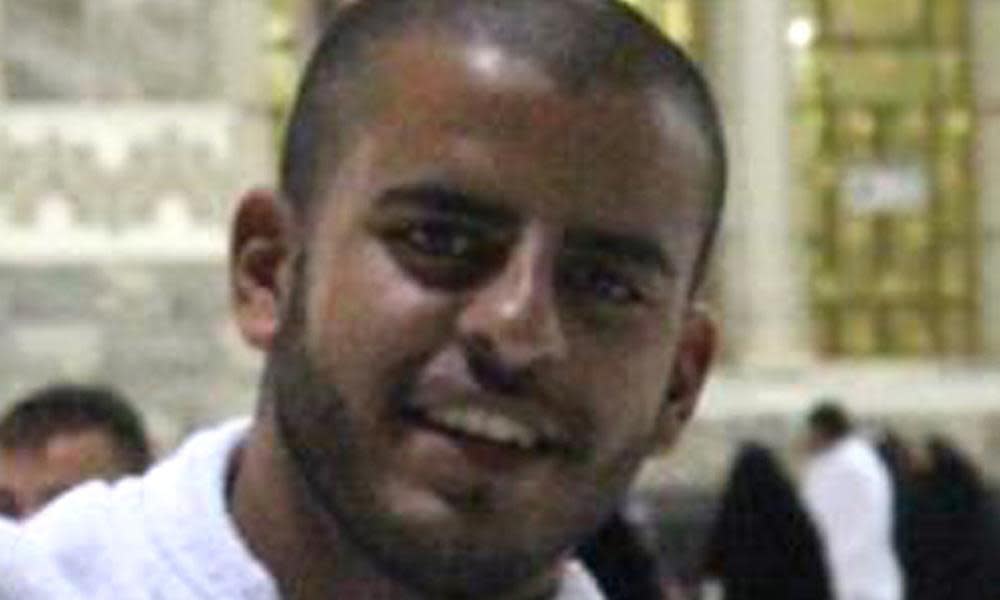Irish man acquitted four years after Cairo protest arrest

An Irish citizen arrested while protesting in Cairo has been freed after four years in detention.
Ibrahim Halawa, from Dublin, was acquitted of charges including murder, arson and illegal possession of weapons at a mass trial in Wadi al-Natrun court outside the Egyptian capital on Monday.
Ireland’s taoiseach, Leo Varadkar, said his government would facilitate Halawa’s return “at the earliest opportunity”.
“We are delighted with today’s news,” said Darragh Mackin, Halawa’s Irish lawyer. “After four turbulent years, Ibrahim Halawa has been found innocent of all charges. He has, from day one, maintained his innocence to the charges. He now looks forward to being reunited with his family an innocent man.”
Halawa was 17 when he travelled to Egypt for a summer holiday with his family, who were among those protesting against the overthrow of the Islamist president Mohammed Morsi in the summer of 2013.
Halawa was arrested at a protest in August that year alongside three of his sisters. Three days earlier, the clearing of a protest camp in Rabaa al-Adawiya square in Cairo had left at least 817 people dead, according to Human Rights Watch.
Halawa was accused of several crimes, including endangering public peace, resisting arrest, violating a mosque and murdering a police officer who reportedly died during the protests.
For many, Halawa became a poster child for victims of Egypt’s increasingly kafkaesque judicial system and its crackdown on the opposition after the overthrow of Morsi.
Although he was 17 and therefore a minor at the time of his arrest, court documents listed Halawa as 18 and he was treated as an adult. He was eventually put on trial along with 473 others, facing the death penalty had he been found guilty.
Letters smuggled out on Halawa’s behalf, first from Cairo’s Tora prison complex and later from Wadi al-Natrun, described the torture he had suffered himself and witnessed being inflicted on other prisoners.
Constant delays to his trial and his sentencing meant Halawa remained in pre-trial detention from the time of his arrest. His trial was delayed 28 times. His sisters, Fatima, Somaia and Omaima, were released in November 2013 without explanation, and were also acquitted by the court on Monday.
Mass trials have become an increasing feature of Egyptian justice since President Abdel Fatah al-Sisi came to power in 2013. On Monday, the court in Wadi al-Natrun handed out 43 life sentences, while 399 other people were sentenced to between five and 15 years in prison. Fifty-two, including Halawa and his sisters, were acquitted.
The US citizen Ahmed Etiwy was sentenced to five years in prison for his role in the Ramses Square protests in 2013, despite the efforts of the US senator John McCain, who recently implored President Donald Trump to intervene as he did during the trial of the American aid worker Aya Hijazi.
Halawa’s family inspired an increasingly vocal public campaign to bring him back to his home city of Dublin, pressuring the Irish government and the European Union to do more to intervene during his detention.
“We’ve always argued that the Irish government took far too soft an approach in dealing with this case,” said Lynn Boylan, a Dublin MEP who campaigned for Halawa’s release.
“With the growing public support for Halawa, and for him to come home, the Irish government realised they were under pressure and had to do something.”
The human rights organisation Reprieve said the verdict was long overdue.
“Ibrahim was arrested as a child for the ‘crime’ of attending a protest, tortured, and tried, facing the death penalty alongside adults in an unfair mass trial. For years, these court proceedings – which were designed to punish political dissent – made a mockery of justice,” said Maya Foa, Reprieve’s director.
Somaia Halawa thanked all those in Ireland who had campaigned for her brother’s release over the last four years.
“I think I would like to have all the people who supported him to come to the airport for him to see how many amazing people he had behind him … to see how much support he had,” she said in a statement.
While Halawa is due to return to Ireland in the coming days, groups such as Reprieve remain concerned about the ongoing use of mass trials in Egypt.
“The wider international community – including the EU, which helps to fund Egypt’s courts – must call urgently on Egypt to end its use of patently illegal mass trials,” Foa said.

 Yahoo News
Yahoo News 
